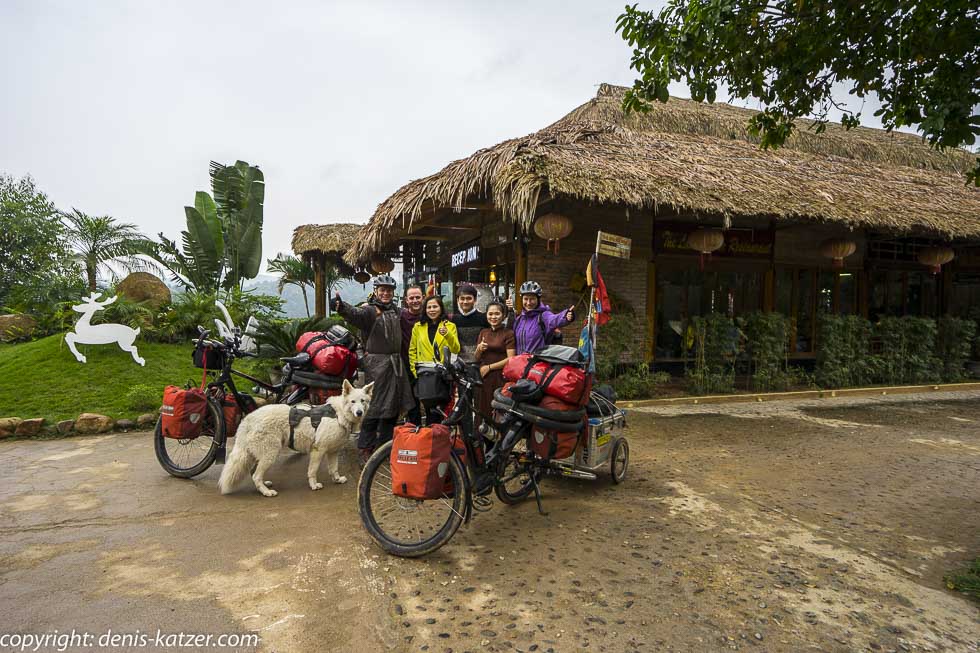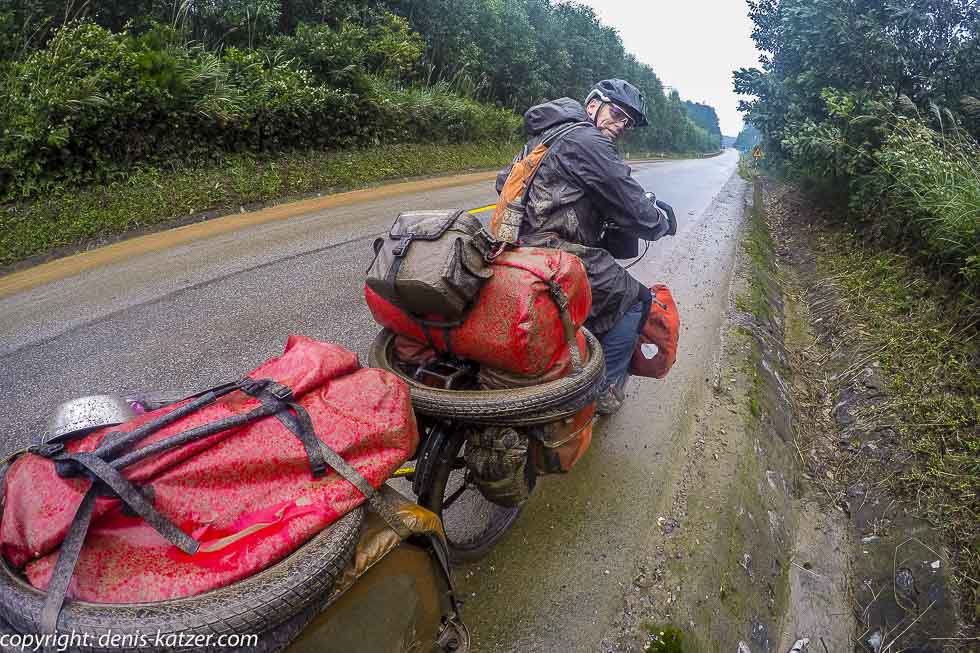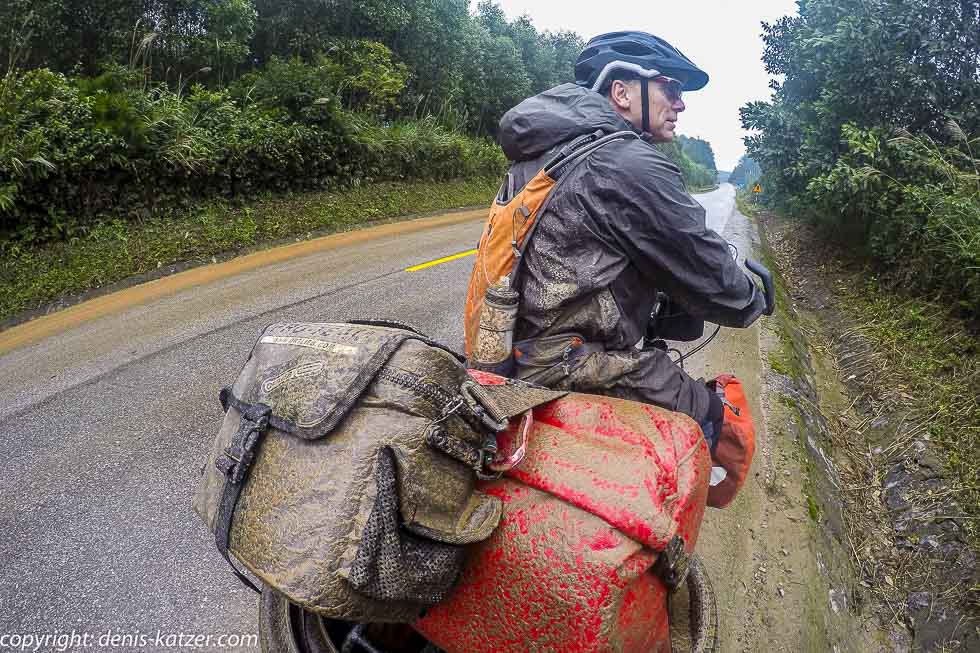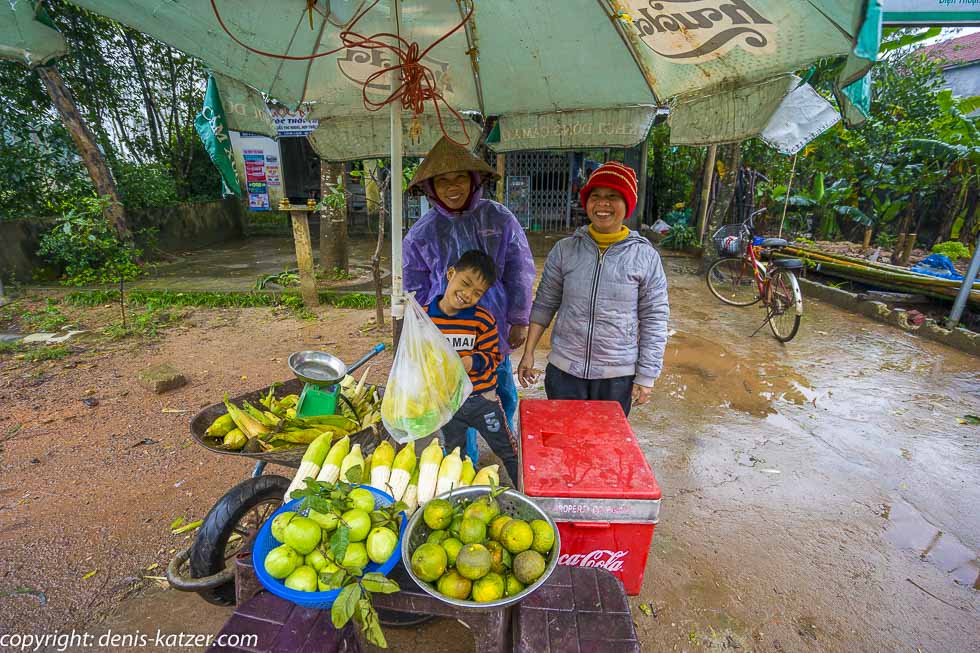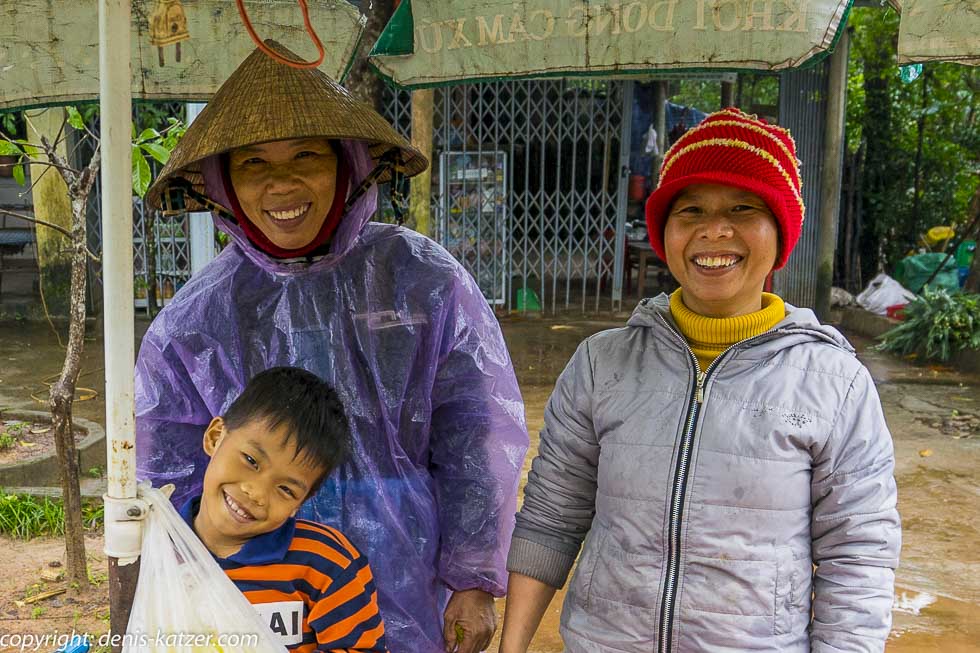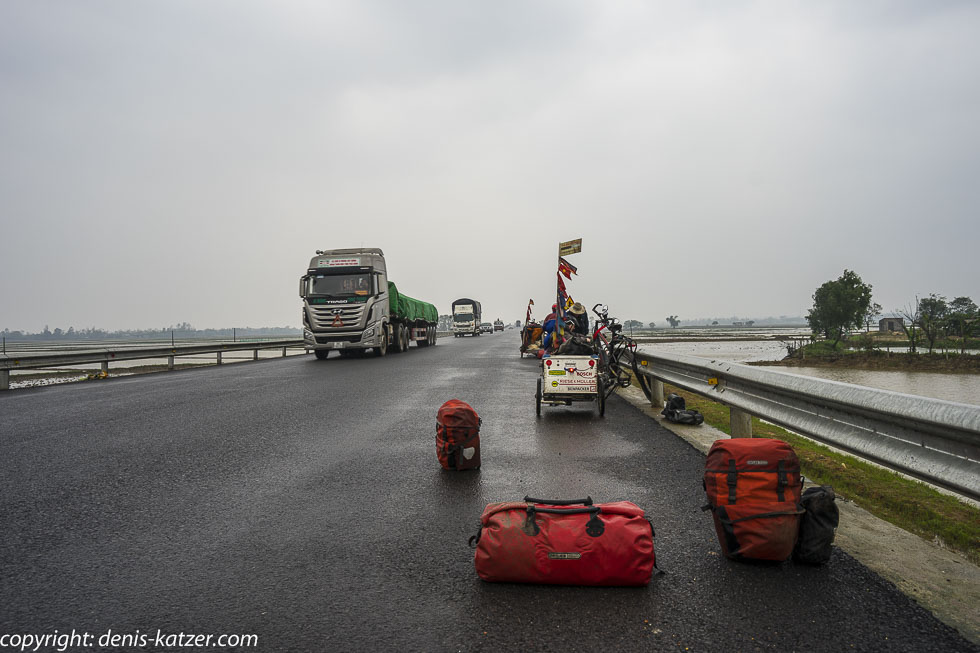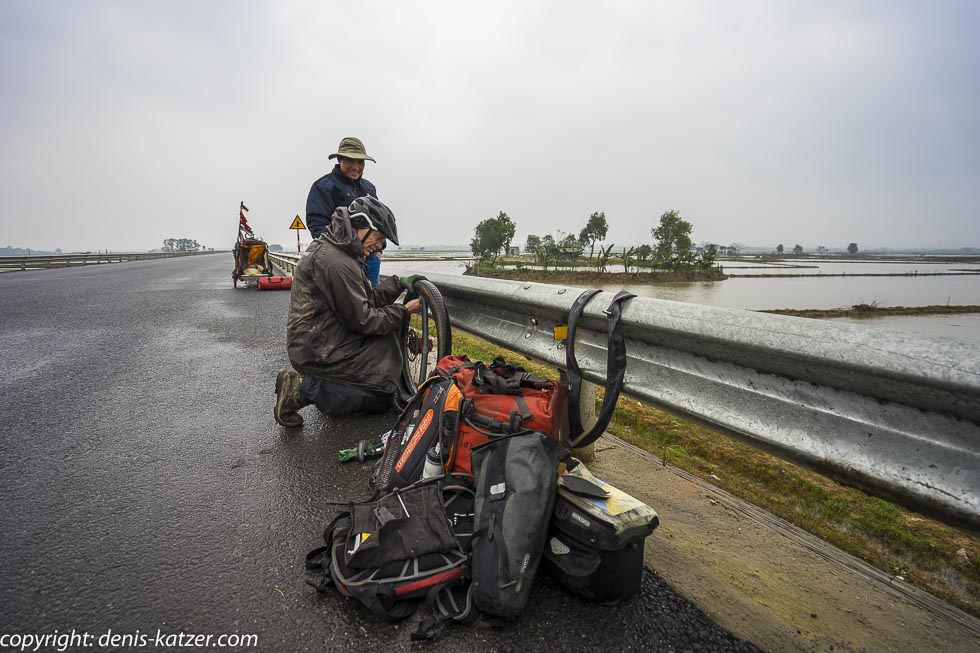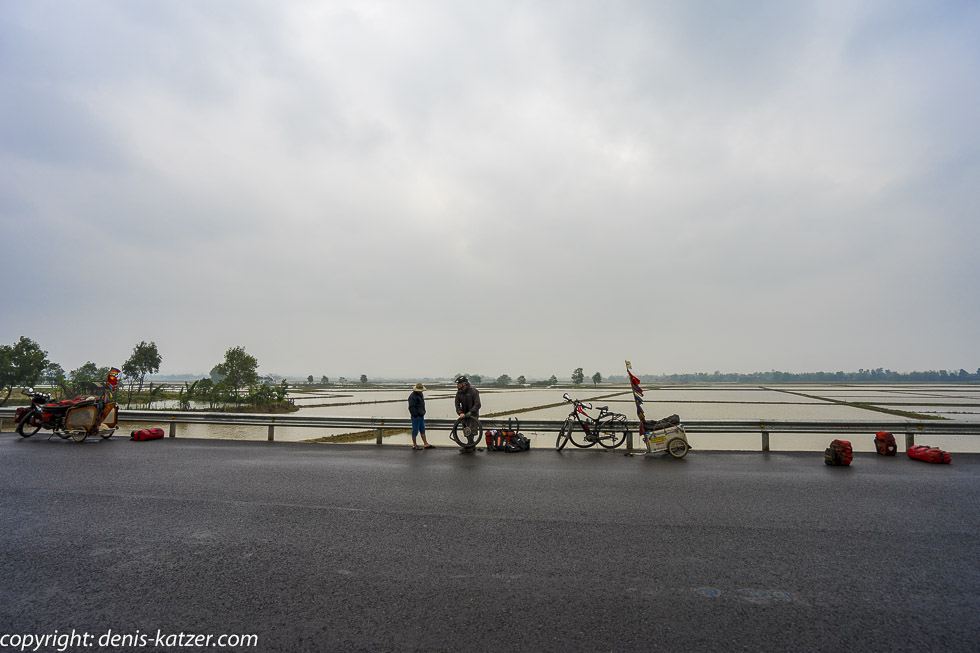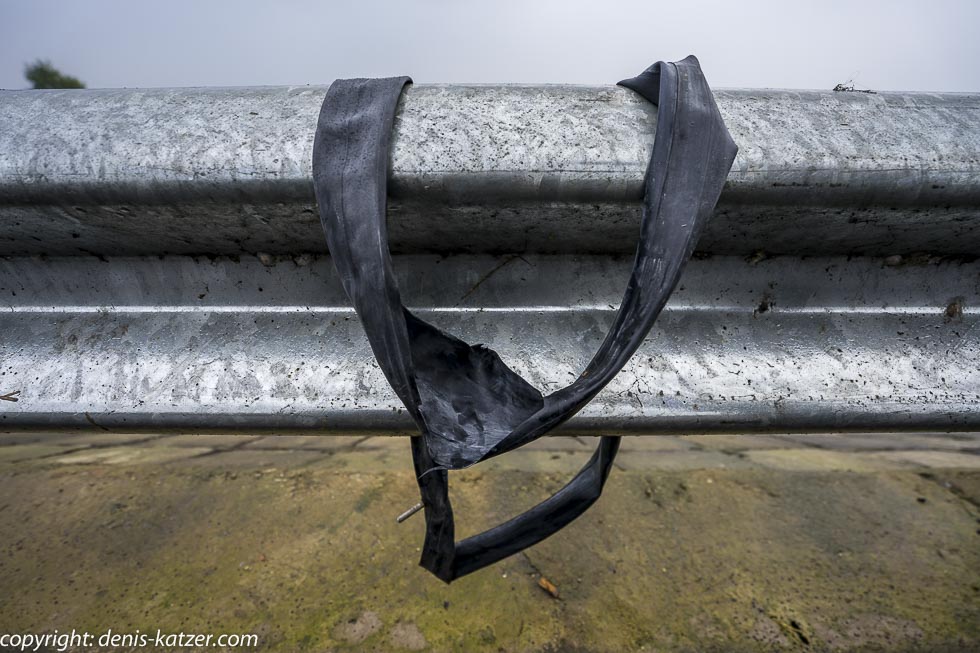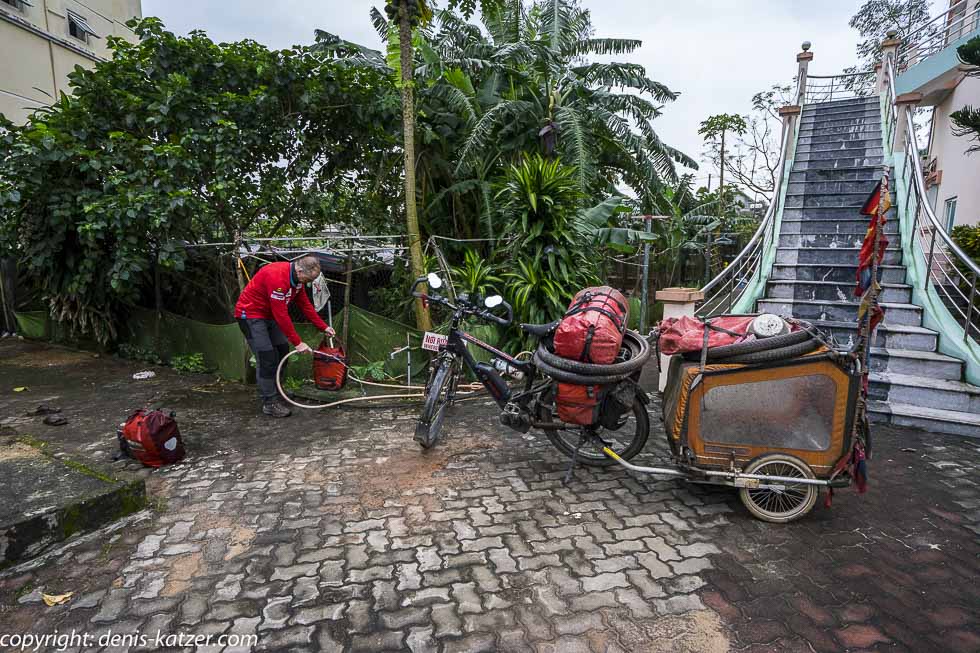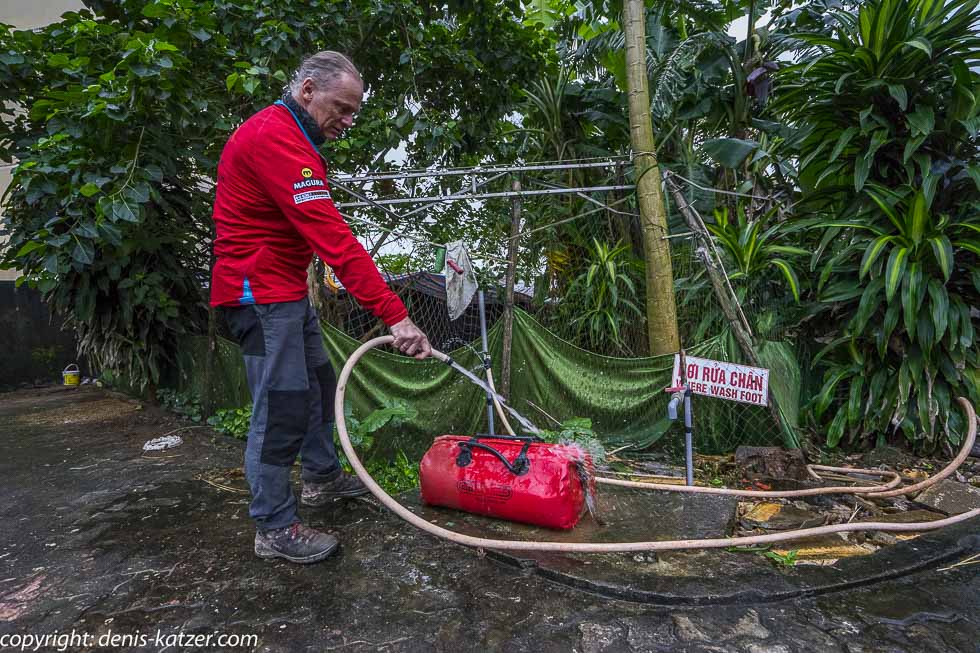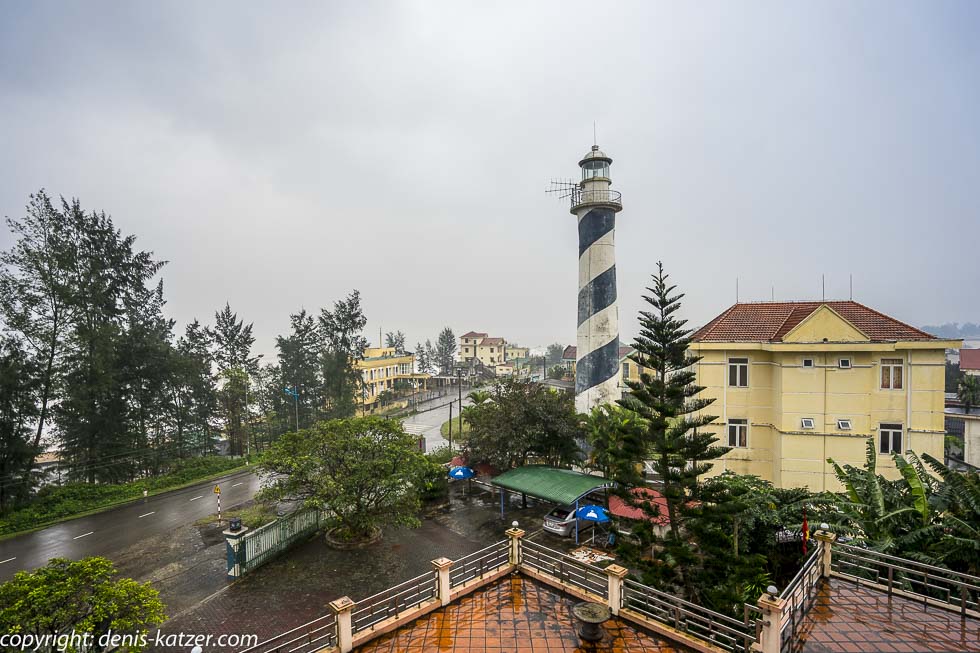
141 km – constant rain – flat tire – bizarre
N 17°01'12.3'' E 107°06'35.0''
Date:
29.12.2016
Day: 548
Country:
Vietnam
Province:
Quảng Trị
Location:
Vinh Moc Tunnels
Latitude N:
17°01’12.3”
Longitude E:
107°06’35.0”
Daily kilometers:
141 km
Total kilometers:
21,333 km
As the crow flies:
102 km
Average speed:
14.0 Km/h
Maximum speed:
44.1 km
Travel time:
5:50 hrs.
Soil condition:
Asphalt
Maximum height:
90 m
Total altitude meters:
58.970 m
Altitude meters for the day:
538 m
Sunrise:
06:19 am
Sunset:
5:26 pm
Temperature day max:
18°C
Departure:
9:00 a.m.
Arrival time:
5:00 pm
(Photos of the diary entry can be found at the end of the text).
It was not easy to say goodbye to the Lake House after the month-long stay. Tham and Tony, the owners of the hotel, had invited us to a lavish farewell dinner yesterday. “Why don’t you stay until our New Year’s party?” they tried to persuade us. Even though the temptation to spend another three days in this beautiful place was great, we overcame our inner bastard and set off this morning despite the bad weather. Our destination today is the small village of Vin Moc on the China Sea. During the Vietnam War, the entire village population dug a deep tunnel system to hide from the constant bombardment by the Americans. “You absolutely have to see this,” a traveler had advised us, which is why we are now cycling the detour.
We don’t stop because of the incessant rain and drive on hour after hour. After 80 kilometers, my right knee starts to complain. “I want to eat a hot corn on the cob!” exclaims Tanja. I pull the brakes and stop next to a tattered parasol, under which two women are sheltering their tiny stall from the wet. “Xin chào!” (Hello), they greet us with shy giggles. With stiff limbs and thighs bloated with exertion, I get off the trestle and buy two large, hot cobs of corn for 10,000 dong (€0.42). “I’m so hungry,” says Tanja, greedily biting into the vegetables. “And me first,” I reply, noticing my incipient ravenous appetite. “How much further is it?” Tanja wants to know. “At least another 40 kilometers.” “A long day.” “Yes, especially an exhausting one. I’m not used to sitting in the saddle for so many hours after the long break. I hope I’m not overstretching my knee,” I say, as the pain gets more and more uncomfortable.
After 110 kilometers we reach Highway One, which is notorious for its heavy traffic and is avoided as much as possible by foreign motorcyclists and cyclists. The large, black truck tires roll past us, smacking loudly. Water splashes over us as they thunder through deep puddles. Tuuuhhhht! Tuuuhhhht! Tuuuhhhht!, sound the loud horns that give us a fright, strain our eardrums and saw at our nerves as if they were 10 meters thick. After just a few kilometers, we miss our peaceful Ho Chi Minh Highway, which we leave for a few hundred kilometers to reach the China Sea.
I stop at a major intersection and check the GPS and the MAPS.ME map program on my smartphone. “Which way?” asks Tanja. According to the directions, we have to go straight ahead, but the map program wants us to follow the highway. There’s probably a turn-off in a few kilometers that will take us to the sea,” I answer confidently and steer my Roadtrain south. A headwind blows the rain in our faces. Not for the first time on this trip, we are soaked to the skin despite our rain gear. I keep looking at the GPS and get annoyed because we are getting further and further away from our destination today. There must finally be a turn-off, or should we have continued straight on five kilometers ago? “Stop!” I shout after the next long bend. “What is it?” “I think we should turn back. There’s no turn-off for miles ahead of us,” I reply as the highway stretches straight ahead. Because I can’t stand detours, I cross the road in displeasure. The wind also seems to want to change direction and blows the wetness into our faces again. In addition to the knee pain, which has become unbearable, my Achilles tendon is now also complaining. Surely I won’t have caught an infection from overworking it? an anxious thought flashes through my brain. Wuuuummm!” an explosion rips through the air. “Oh no!” I shout into the wind, stop, put my bike on the stand and hurry to Tanja. “After the impact, the bike immediately started to lurch. But I was able to stop without falling.” “Your rear tire tore,” I reply. “Bloody hell! Now I have to replace the tire in this shitty weather,” I curse indignantly, but quickly calm down again. After unloading the bike, I remove the rear tire and take a look at the torn inner tube. “It’s no longer usable. Fortunately, the casing seems to be okay.” “But how can it tear the inner tube like that?” wonders Tanja. “Do you remember? That happened once before in Mongolia. I think I inflated the tires too much back then.” “And do you think that’s the reason again this time?” “Hm, it could be. I did constantly check the tire pressure when using the compressor, but maybe the pump display wasn’t right or 3.5 bar is just too much.” “How many bars are allowed?” “Four bar, but if the bike is heavily loaded, the load on the tube may be too high. I don’t know. In future, I’ll only put in three bar,” I say, putting the rear tire back in.
Almost two hours later we reach the crossroads where the map program had sent us in the wrong direction. We turn off in the direction of Vin Moc. “Did you see the sea too?” Tanja exclaims enthusiastically. To our right, wind-whipped, meter-high waves crash onto the deserted beach. Even though my mood is not the best because of the pain, I can feel a euphoric feeling permeating my body. After the Gobi Desert, thousands and thousands of kilometers in the mountains through China and Vietnam, we now cycle along the turbulent China Sea. Due to the constant wetness, moss has formed on the coastal road and it is slippery in places. We continue our mammoth tour carefully today and after 141 kilometers and a torn inner tube we reach the small hotel where we reserved a room by phone yesterday.
“I’ve been waiting for you,” the owner greets us in relatively good German. “Where did they learn our language?” I ask, puzzled. “I lived in Berlin for ten years.” “Do you have a water hose that we can use to clean our equipment and bikes?” I ask, because everything is covered in mud and dirt. “Down there,” he points to a tap right next to the chicken enclosure. Limping with pain, I take the bikes to the designated place and start work while Tanja and our friendly host carry the bags into the house, where we are the only guests. It takes me an hour to clean the equipment and bikes of the coarsest dirt. Then I roll the precious bikes into the basement of the hotel, lock them up as usual and cover them with a tarpaulin.
We can hardly move in the tiny room because of all the bags. Ajachi has to get up every time we have to go to the bathroom or go to the door. The lack of heating makes it cold and the wet clothes and bags make it damp and clammy. It could hardly be more uncomfortable. “Let’s go out for something to eat,” Tanja suggests. Tired, I get up from the low, uncomfortable wooden chair. I follow her through the dark hotel corridor with a limp. All the lights are out or simply not working. We shuffle through the dark village because there is no street lighting. I think longingly of our last accommodation, where it was cozy and there was delicious food every day. In a simple room, open on all sides and also extremely uncomfortable, there are a few plastic chairs and tables. Two girls, about eight and twelve years old, are frying their dinner in a pan. “Đó là những gì để ăn?”, (Is there anything to eat?) asks Tanja. The girls nod and show us a ready-made soup from the packet. We say goodbye and head for another, equally ugly restaurant by the stormy sea. Here, too, we are the only guests. With our poor knowledge of Vietnamese, sign language and phrasebook, we manage to order rice, eggs, tofu with tomatoes but without flavor enhancers. So that our dinner doesn’t taste quite as sad as it looks, we wash it down with a few cans of beer. “Well, I find it bizarre here,” says Tanja. “Hm, and how am I supposed to understand that?” “I like it.” “Sometimes you’re really weird.” “Imagine if I complained to you and accused you of where you’ve led me again today? I’m sure you wouldn’t like that.” “You’re right about that. Come to think of it, I don’t think it’s so bad here either,” I reply with a laugh and open another can of warm beer. “Do you think your knee will be okay tomorrow?” “You want to know if we can continue?” “Yes.” “I don’t think it looks good. I think my knee needs a few days rest.” “Does that mean my dream will come true and we’ll spend New Year’s Eve by the sea?” “I think so.” “Like I said, I like it here. I’m sure we won’t forget this New Year’s Eve…”
If you would like to find out more about our adventures, you can find our books under this link.
The live coverage is supported by the companies Gesat GmbH: www.gesat.com and roda computer GmbH http://roda-computer.com/ The satellite telephone Explorer 300 from Gesat and the rugged notebook Pegasus RP9 from Roda are the pillars of the transmission. Pegasus RP9 from Roda are the pillars of the transmission.
